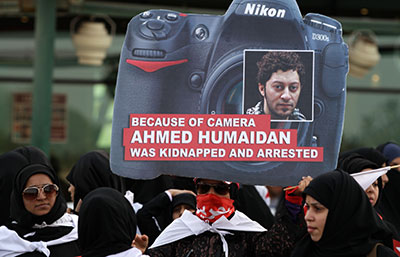The Bahraini press, like almost everything else in the island country, is sharply divided. If the government would take steps to strengthen press freedom instead of restricting access, then much of this divide could be bridged.
In both style and substance, the schism in the press is vast. Take for instance how newspapers covered last month’s anniversary of the February 14, 2011, pro-democracy protests. In one narrative, rioters and terrorists ran rampant across the country attacking schools and martyring a policeman. In another narrative, tens of peaceful rallies commemorated the second anniversary of the revolution, as opposition and human rights groups called for investigations into the martyrdom of a child by shotgun fire.
Deep as this divide may be, it is not inevitable. Actors on all sides have deepened the schism by pushing their political agendas in the echo chambers of partisan media outlets. But the greatest culprit is the Bahraini government, which has sought to push its own narrative through a potent mix of intimidation, public relations campaigns, and reprisal against critical outlets.
The government has frequently emphasized the importance of freedom of expression and the need for reconciliation. Last year, King Hamad asserted in a speech that “the key to reform is through press freedom.”
The government should honor the king’s speech by addressing the most important hindrance to press freedom in Bahrain: inaccessibility. It could begin today by improving press access in three ways.
First, the government must allow greater access to international journalists. One journalist who has reported from Bahrain and asked to remain anonymous, fearing reprisal, told me that he can “count on one hand the number of reporters who have never been denied a visa.” CPJ has been excluded; so have at least 220 journalists, NGOs, and academics in the past two years, according to research organization Bahrain Watch.
Even when international journalists gain access to the country, security forces often hinder their ability to cover news event despite their press credentials. For example, security forces temporarily detained three photographers working for international news agencies trying to cover the February 14 anniversary protests.
Abdulla al-Mannai, the head of the Freedom Committee of the Bahrain Journalists Association, told me there were “a few issues” involving international journalists, but he insisted they “have been issues of entering into the country under false pretenses.” Admittedly, some journalists have violated procedures by reporting while on tourist visas.
Yet the government has exploited its right to determine who enters its borders in order to push its own narrative and punish those who question it. It opens the floodgates to journalists whenever there is an event it wishes to publicize, like the annual Formula One race and the Manama Security Dialogue, and restricts access when there are events it hopes to hide, like major protests. At least seven international journalists were detained during last year’s Formula One race because they decided to cover more than just fast cars.
Saqer Al-Khalifa, a former media attaché for the Bahraini government, told me in an interview that while he reads a lot of oversimplified and biased articles on Bahrain, the government must learn to better engage critical journalists. Denying them access, he continued, is not “the way the 21st century should work.”
Second, the government must allow local and citizen journalists more access to the international media scene. By keeping out international journalists, the Bahraini government has forced the international press to rely on local sources who sometimes lack professional training and elide journalism with activism. According to one journalist familiar with Bahrain who asked to remain anonymous for fear of reprisal, citizen journalists face “serious direct targeting […] while the authorities exercise ‘restraint’ dealing with [international journalists] fearing backlash.” All three journalists who have been killed in Bahrain since February 14, 2011, were local. In December freelance photographer Ahmed Humaidan was arrested for participating in illegal demonstrations.
The government has also sought to make communication between local and international journalists difficult, even dangerous. In July, researchers from the University of Toronto uncovered the government’s targeting of activists and journalists through a commercial surveillance program that could record and relay emails, screenshots, and Skype audio conversations. The journalist who has reported from Bahrain told me he was certain his phone was monitored, a scary prospect for his sources (for more on this topic, see Attacks on the Press). Such measures cast a chilling effect as sources weigh the risks of communicating with journalists.
Third and perhaps most importantly, the government must encourage greater interaction between opposing sides. The majority of press outlets in Bahrain, like Bahrain TV, are either owned directly by the government, or, like Al-Watan newspaper, owned by individuals closely associated with the government. These outlets rarely cover human rights activists and opposition leaders. Brian Dooley of Human Rights First told me an indicator of progress would be if these outlets began to cover stories about dissent. Government officials should also make a greater effort to reach out to independent outlets like the printed daily Al-Wasat.
Of course, the opposition must also be willing to engage with government-affiliated outlets. In my discussions with activists and opposition politicians, most have expressed that willingness to reach out. However, there have been incidents where anti-government protesters reportedly attacked journalists from state-affiliated media and Saudi-owned al-Arabiya. Such attacks are counterproductive and betray the peaceful methods adopted by the majority of the pro-democratic movement.
As Al-Wasat editor and CPJ International Press Freedom Award winner Mansour al-Jamri told me, “there is still a long way to go before we see an exit from the current dark tunnel.”
